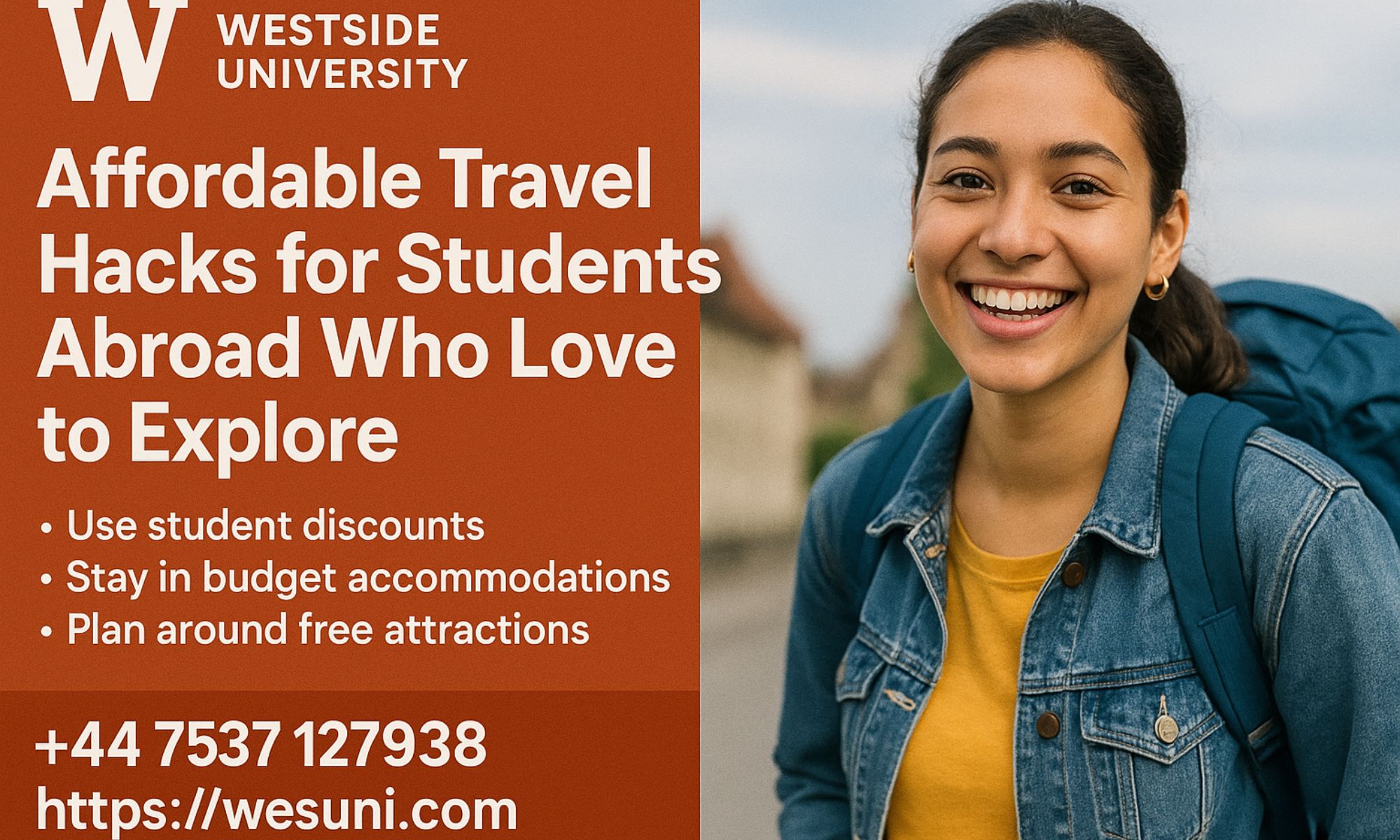Studying abroad is an exciting adventure filled with academic growth, cultural discovery, and countless travel opportunities. While tuition, accommodation, and living expenses already stretch most student budgets, many international students are eager to explore their host country (and neighboring countries) without going broke. The good news? With the right strategies, you can travel affordably while still experiencing unforgettable adventures.
In this comprehensive guide, we’ll cover affordable travel hacks for students abroad, helping you stretch your budget, explore more, and make the most out of your study abroad journey.
✈️ 1. Start with Student Discounts
One of the biggest perks of being a student is the sheer number of discounts available to you. From transport passes to museum entries, many organizations support student travelers.
- International Student Identity Card (ISIC): Recognized in more than 130 countries, ISIC provides discounts on flights, buses, trains, and cultural attractions.
- Youth rail passes: In Europe, students under 27 can access discounted Eurail and Interrail passes.
- Local student benefits: Many cities offer student metro passes, bicycle rentals, and discounted entry to cultural sites.
👉 Pro tip: Always carry your student ID—it can unlock huge savings you never expected.
🏨 2. Travel Smart with Budget Accommodation
Accommodation can quickly eat up your travel budget, but you don’t always need a luxury hotel to enjoy your trip.
- Hostels: Platforms like Hostelworld let you book affordable beds in student-friendly dormitories.
- Student networks: Join student Facebook groups or WhatsApp communities where people often post room-sharing opportunities.
- University connections: Some universities offer cheap accommodation during holiday breaks when dorms are empty.
- Alternative options: Consider Couchsurfing, which connects travelers with hosts offering free stays.
Not only are these options cheaper, but they also give you a chance to meet other like-minded travelers.
🚌 3. Use Affordable Transport Options
Transportation is often a hidden cost when exploring abroad. Here are smart ways to save:
- Budget airlines: Carriers like Ryanair, EasyJet, and Wizz Air offer low-cost flights across Europe. In Asia, AirAsia and Scoot provide great deals.
- Long-distance buses: FlixBus and Megabus provide cheap intercity connections.
- Student train passes: Countries like France, Germany, and Japan offer rail discounts for students.
- Walk and bike: Not only is this free, but it’s also the best way to discover hidden gems.
👉 Pro tip: Book in advance and travel light—budget airlines often charge high fees for checked luggage.
🍲 4. Save on Food While Traveling
Eating out can be tempting, but it adds up fast. Keep your food budget under control with these tricks:
- Cook your meals: Book hostels with kitchens and prepare simple dishes.
- Local supermarkets: Grab fresh food, snacks, and water instead of buying at tourist spots.
- Street food: In Asia, Latin America, and parts of Europe, street food is both cheap and authentic.
- Student canteens: Some universities allow guest access to their student cafeterias, which offer budget-friendly meals.
🎟️ 5. Plan Around Free Attractions
Every city has something to offer for free.
- Free walking tours: Available in most major cities—just tip your guide at the end.
- Museums with free days: Many museums and galleries have certain free admission days each month.
- Parks and outdoor activities: Hiking, beaches, and local festivals often cost nothing.
- Student cultural cards: In some countries, these cards grant free entry to heritage sites.
📱 6. Use Technology to Find Deals
Leverage apps and websites to save money on your travels:
- Skyscanner & Google Flights: Compare and track flight prices.
- Rome2Rio: Find the cheapest travel routes between destinations.
- BlaBlaCar: Ride-sharing app connecting drivers with travelers.
- Hostelworld & Booking.com: For affordable stays.
- Airbnb discounts: Look for student referral codes to save.
👉 Pro tip: Clear your browser cookies or use incognito mode when searching for flights to avoid price hikes.
🤝 7. Travel in Groups
Traveling with friends helps you split accommodation, food, and transport costs. Group travel also means bulk discounts on tours and private transport.
- Rent an Airbnb together.
- Share taxis and rideshares.
- Cook group meals to save money.
Plus, traveling with friends makes the experience more enjoyable and safe.
🧳 8. Pack Light and Smart
Overpacking can cost you extra baggage fees and slow you down. Instead:
- Carry a backpack that fits cabin luggage dimensions.
- Use packing cubes to stay organized.
- Bring versatile clothing suitable for different weather conditions.
💡 9. Be Flexible with Travel Dates
If you can adjust your schedule, you’ll unlock cheaper flights and stays. Midweek flights and off-season travel often cost significantly less than weekends and peak holidays.
🌐 10. Take Advantage of Local Experiences
Sometimes the best experiences are the cheapest:
- Attend local cultural events and student meetups.
- Explore hidden neighborhoods instead of expensive tourist areas.
- Volunteer for free tours or events in exchange for perks.
🎓 Final Thoughts
Traveling abroad as a student doesn’t have to drain your wallet. With smart budgeting, careful planning, and resourceful hacks, you can explore new countries, meet incredible people, and create lifelong memories—all while keeping costs down.
Your study abroad journey is about more than lectures and exams—it’s also about exploring the world and learning beyond the classroom. With these travel hacks, you can do just that without financial stress.
📞 Call to Action
At Westside University (WesUni), we don’t just guide you through admission, scholarships, and visas—we also help you live your best student life abroad. That includes helping you make the most of your travel opportunities.
👉 Ready to start your study abroad journey? Contact us today at +44 7537 127938 or visit https://wesuni.com.
🚀 Key Takeaways
- Always use your student discounts.
- Travel light, book early, and be flexible.
- Stay in hostels, cook meals, and use local transport.
- Explore free attractions and cultural events.
- Group travel = shared fun and shared costs.


